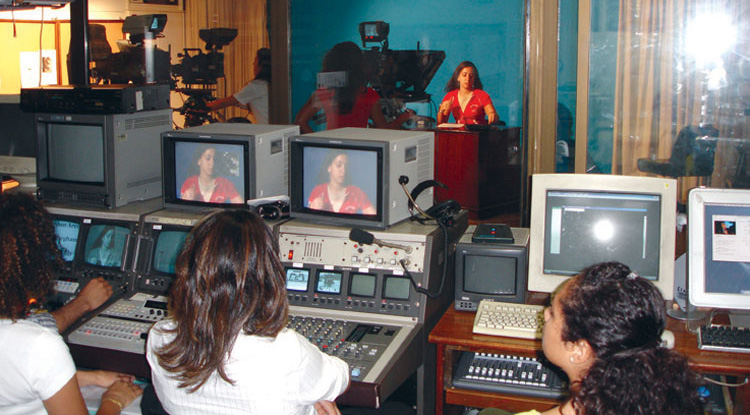|
Meet the Arab Press
“Arabic TV does not do our country justice,” U.S. President George Bush complained in early 2006, calling the Arab media a purveyor of “propaganda” that “just isn’t right, it isn’t fair, and it doesn’t give people the impression of what we’re about.”
Citing this as a “prime example of how Arab news media have been demonized” by the U.S. administration, Lawrence Pintak, director of the Kamal Adham Center for Journalism Training and Research, used results from a survey he recently conducted with Arab journalists to disprove these claims.
“Arab journalists don’t hate America,” Pintak said. “They hate the fact that –– from their perspective –– the U.S. just doesn’t live up to its own values or promises. They have been painted as the enemy; in reality, they are potential allies for a smart administration.”
Pintak, in collaboration with Jeremy Ginges of the New School for Social Research in New York, conducted a survey with 601 journalists from 13 Arab countries in North Africa, the Levant and the Arabian Peninsula. The survey, the first of its kind to be conducted on such a wide scale, received the cooperation of major pan-Arab news organizations. Survey results show that Arab journalists are not anti-American and consider themselves agents of change, similar to their Western counterparts. “The findings shatter many of the myths upon which American public diplomacy has been based,” stated Pintak.
The study shows that 62 percent of Arab journalists have a favorable view of the American people even though they dislike the U.S. government. Many of the journalists surveyed are skeptical about America’s calls for democratic reform, Palestinian rights and U.S. aid to victims of the 2005 tsunami, labeling these as insincere attempts to oppose anti-Americanism.
The study also demonstrated that the primary goal of journalists in the Arab world is to create political and social reform in the Middle East. Almost 75 percent of the respondents indicated this as a top priority, an outlook that is not at odds with the Bush administration’s purported “democratic agenda” for the region. Whether or not they put it as their primary journalistic mission, almost all of the journalists surveyed said Arab society was in need of change. Of these, two-thirds said the change should be gradual, while a third supported radical adjustment. “Many see themselves as agents of political and social change who believe it is their mission to reform the antidemocratic regimes they live under,” Pintak said. “Rather than being the enemy, most Arab journalists are potential allies whose agenda broadly tracks the stated goals of U.S. Middle East policy and who can be a valuable conduit for explaining American policy to their audiences.”
The survey attempted to understand the priorities of Arab journalists as a whole. When asked about the top 10 missions of Arab journalism, respondents cited political reform, human rights, poverty and education as the most important, ranking Palestinian statehood, the war in Iraq and terrorism farther down the list. In addition, U.S. foreign policy, lack of political change and Israel were viewed as the greatest threats to the Arab world.
With respect to their political beliefs, half considered themselves democratic, and only small percentages identified themselves as Islamists (10 percent) or Arab nationalists (15 percent). Most of the journalists who participated in the study were skeptical about the role of the Muslim clergy in society and supported the separation of mosque and state.
Arab journalists are also pragmatic. Almost half say Western “interference” in the Arab world is permissible if it benefits the Arab people, though the overwhelming majority says nothing can justify the invasion of Iraq. They were also critical of their own professionalism and independence, saying that only 11 percent of Arab journalists are truly free to write as they please.
Summing up the study, Pintak explained that future relations between Arab countries and the Western world would have to include a healthy role for the Arab press. “If the next administration is going to try to reach out to the Arab people, it won’t get far by blaming the messenger,” he said.
Journalism Center Changes Name, Adds Master’s Degree
The Center for Electronic Journalism has changed its name to the Kamal Adham Center for Journalism Training and Research, in recognition of a $5 million contribution from Faisal Adham in the name of his late father, who provided extensive support for the center.
The contribution will be used for construction of state-of-the-art digital training facilities on the New Cairo Campus and for the establishment of a $4 million endowment to support continued operations of the center.
“The late Sheikh Kamal Adham would have certainly been proud of the success the Adham center has achieved up until today, since AUC was at the top of his priorities,” said his son, Faisal Adham. “I assure you I will continue supporting this center and this great institution.”
In addition to the name change, the center has just launched a new two-year master’s degree in television and digital journalism, with more than 20 students in the inaugural class.
“This degree expands the focus of our existing degree from television journalism to include online journalism and other forms of digital media,” said Lawrence Pintak, the center’s director. “It will better prepare our students for the new shape of Arab journalism in the 21st century.”
|
